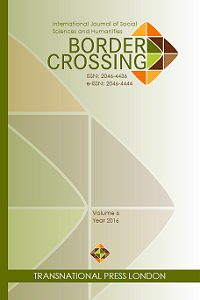About the Journal
Border Crossing is an interdisciplinary and peer-reviewed international Open Access journal of Social Sciences and Humanities. Border Crossing aims to encourage multidisciplinary and interdisciplinary debate in Social Sciences and Humanities. Articles from any disciplinary areas are welcome. The journal warmly welcomes contributions from diverse disciplinary areas, spanning Anthropology, Sociology, Psychology, International Relations, Political Science, Legal Studies, Business and Management, Social Work, and beyond. Researchers and scholars are encouraged to share their original research, case studies, field notes, commentaries, as well as reviews and book reviews.
Border Crossing publishes two issues a year: January-June and July-December. Articles are published online immediately once they are successfully reviewed and approved. The Journal follows a strict double-blind review policy embedded in our general publishing ethics.
Border Crossing is an Open Access publication, allowing users to freely access, download, copy, distribute, print, search, or link to full-text articles for any lawful purpose without requiring permission from the publisher or author.
Border Crossing is published by Transnational Press London.
Border Crossing is abstracted and indexed in: Central and Eastern European Online Library (CEEOL), China Academic Journals Database (CNKI Scholar): CNKI search, EBSCO Academic Search international, ERIH PLUS (Erih Index), Finland Publications Forum (JUFO), Norwegian Register of Scientific Journals, Series and Publishers, Research Papers in Economics (RePEc): RePEc search, Sherpa RoMEO. Border Crossing is also included in American Sociological Association's Publication Options Journal Directory.
Peer Review Process
Border Crossing follows a double blind peer review policy. Articles submitted to the journal are screened by the editorial team and then, if appropriate, sent to two reviewers. Finally, in the light of reviewer comments, the editorial team reaches a decision about publication. This decision is final.
Research Articles, Letters, Brief Communications, Case Studies, Reports, Analysis, Reviews, and Viewpoints are peer-reviewed. All forms of published correction may also be peer-reviewed at the discretion of the editors. Other contributions are not usually peer-reviewed.
All submitted manuscripts are read by our editorial staff. Only those papers that seem most likely to meet our editorial criteria are sent to reviewers. Those papers judged by the editors to be of insufficient general interest or otherwise inappropriate are desk rejected without external review. Manuscripts judged to be of potential interest to our readership are sent to two or more reviewers. The editors then make a decision based on the reviewers' advice.
Reviewers are welcome to recommend a particular course of action, but they should bear in mind that the other reviewers of a particular paper may have different technical expertise and/or views, and the editors may have to make a decision based on conflicting advice. The most useful reports, therefore, provide the editors with the information on which a decision should be based. Setting out the arguments for and against publication is often more helpful to the editors than a direct recommendation one way or the other.
Our editors evaluate the strength of the arguments raised by reviewers and by the authors, and may also consider other information not available to either party. Our primary responsibilities are to our readers and to the scientific community at large, and in deciding how best to serve them, we must weigh the claims of each paper against the many others also under consideration. Reviewers' criticisms are taken seriously, particularly the technical criticisms.
Publication Frequency
Border Crossing publishes two issues per volume: January-June and July-December.
Code of Conduct and Publishing Ethics
Border Crossing follows the rules of publication ethics to ensure academic objectivity and rigour of the journal. Transnational Press London is committed to maintaining the publication ethics standards. We, therefore, ask that all contributors and reviewers adhere to publishing ethics. Further guidance can be found through Transnational Press London Publishing Ethics Policy which closely follows the COPE guidelines.
Open Access Policy
Border Crossing is an open-access publication, allowing users to freely access, download, copy, distribute, print, search, or link to full-text articles for any lawful purpose without requiring permission from the publisher or author.
Open Access Article Processing Fees for Border Crossing is waived in 2024.
OA Fees can be paid directly at: https://www.tplondon.com/product/oaf/
This journal offers a limited number of Open Access fee waivers to authors from disadvantaged backgrounds. to benefit from this policy, please email the editor once your paper is accepted.
Once the payment is made, please email the receipt of payment along with the title of the paper and name(s) of the author(s) to: admin@tplondon.com
CC BY NC ND
The works published in this journal are licensed under a Creative Commons Attribution-NonCommercial-NoDerivatives 4.0 International License.
Authors of articles published in this journal retain the copyright and full publishing rights without restrictions.
This journal allows all versions to be deposited in an institutional or other repository of the author’s choice without embargo.
This journal is included in PKP Preservation Network archives:
Journal History
Border Crossing was launched in 2011 as a working paper series by Professor Ibrahim Sirkeci, then at Regent's University London, and in 2015, it was transformed into a peer-reviewed journal.
Copyright © 2012-2024 Border Crossing / Transnational Press London | All rights reserved








